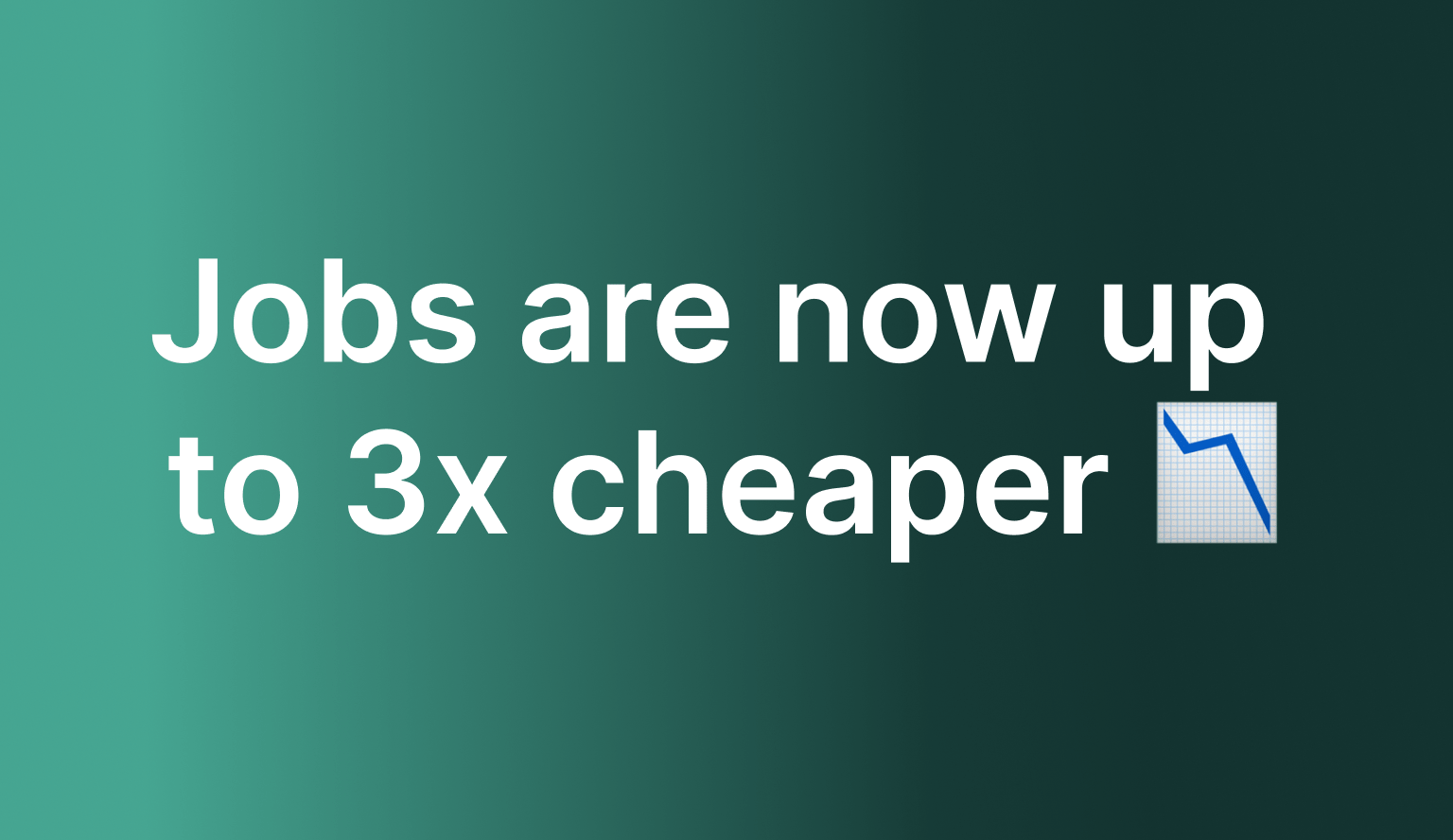TL;DR
- Consuming jobs via API or webhooks is now up to 3x cheaper.
- We are now the cheapest job data platform tool among competitive products.
- The
technology_slugsfield in thejob.company_objectobject will be empty by default in job search responses.
Why are we doing this?
We want to keep prices as low as possible while ensuring our business remains sustainable.
Here’s what’s changed:
- Our scraping is now more efficient, so we can deliver more jobs without increasing costs.
- We’ve simplified the product to focus on what users really need - most don’t use company tech stack data in the job search endpoint, so we’ve removed it by default.
- As our user base grows, we can spread fixed costs across more customers, helping us keep prices low.
Most of our competitors are sales-led, so:
- You need to talk to sales before even trying the product
- To cover the cost of their sales team, they need to charge higher prices
- And the self-serve experience is not a priority
We want to be the opposite of all that, and this price change reinforces our position:
- We put a lot of effort into building a very intuitive UI
- We heard more than once that customers love how good our API documentation is
- We already offer a generous free tier to let you figure out if TheirStack is good for you
- And with this price change, we want to make it a no-brainer for you to go with TheirStack, no matter if you'll need 10k jobs per month or millions of them
How is our pricing changing?
Until now, every record accessed through our API or Webhooks—whether it was a job or company record with its full tech stack—consumed one API credit.
We are changing that. We've multiplied the credits all users have by 3x. To keep the company cost the same, accessing a company record will now cost 3 credits, while job records will cost just 1 credit each. Here is what this means for you:
- If you use our job search endpoint or webhooks, you will now get up to three times more jobs for the same price.
- If you use our company search endpoint, nothing changes. Each company now costs three API credits, and your credits have increased 3x.
- If you use app.theirstack.com or our datasets, your experience and pricing stay the same.
Important API change
Starting June 4, 2025, the job.company_object.technology_slugs field in Job search endpoint responses will always be an empty list. This field previously contained the full list of technologies used by the company.
In order to lower the cost per job as much as possible, we are removing data that most of our job search endpoints users don't require. If you still need this information, you can retrieve it by making a separate request to the Company Search endpoint for each company.
Note: You can continue using the company_technology_slug_or or company_technology_slug_and filters in your Job Search queries. When these filters are applied, the technology_slugs field will include only the technologies specified in the search criteria.
How will this impact me?
For existing customers
Your monthly bill will be the same, but you will have more credits. The Invoices section will accurately reflect the number of credits you have in every invoice.
If you have an API subscription created before June 4, 2025, the number of credits that appear on on each invoice PDF downloaded from Stripe won't change. But invoices for those subscription issued after June 4, 2025 will will receive 3x the amount of credits.
If you have an auto-recharge rule, new invoices will reflect the actual number of credits you'll get, and you'll simply pay less when those invoices are issued, according to our new public pricing.
For new customers
For customers that create subscriptions after June 4, 2025, you'll be charged according to the new prices from our pricing page, that are 60-65% cheaper than the previous ones.
To for example, if you wanted to fetch 20,000 jobs per month, before you would have to pay $694 a month. Now, you would only have to pay $239 a month. You'd save $2,174 annually.
You can see all the new prices on the pricing page, but here's a breakdown of the changes at different volumes:
| Volume | Old price | New price | Change | % reduction |
|---|---|---|---|---|
| 5,000 jobs | $248 | $100 | 2.5x cheaper | 60% |
| 10,000 jobs | $495 | $169 | 2.9x cheaper | 66% |
| 20,000 jobs | $694 | $240 | 2.9x cheaper | 65% |
| 50,000 jobs | $993 | $400 | 2.5x cheaper | 60% |
| 100,000 jobs | $1,490 | $600 | 2.5x cheaper | 60% |
| 200,000 jobs | $2,480 | $900 | 2.5x cheaper | 60% |

